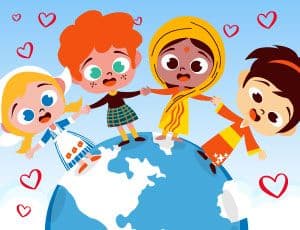Escola Games | Jogos Educativos
https://www.escolagames.com.br
Teacher's support sheet

World Peace
This is a very special game! Let’s think and spread peace messages to everyone. Help the white dove give hearts to all the kids and make them happy! You can control its ways and give hearts to each child. Let’s play?

Teacher's tips
Level of education: Elementary School
Age: 05 to 07 years old
Many speak of peace. However, it is also necessary to educate for peace. It is through education for peace that we will change the world scenario. Small attitudes planted today can be harvested tomorrow. In this sense, children play a very important role, as they will be the future of humanity and it is through them that we need to plant and cultivate peace. [FIM-DICA]
Learner outcomes
Develop motor coordination;
Understand the importance of peace;
Spread peace;
Identify the nature of the foci that generate violence.
Seek peace alternatives, with reality-transforming actions, about the situation experienced in the school day-to-day, proposing to the family, the school community, and society a new vision in the face of violence
Develop vocabulary;
Form sentences;
Understand short sentences and texts;
Listen and associate the sound with the writing of the words;
Teachers' goals
Provide a creative environment;
Analyze together with the group (students, teachers, employees, parents and community) the construction of interpersonal relationships, jointly developing measures to prevent violence in everyday social life.
Provide opportunities for searching, analyzing and reflecting on peace.
Create strategies that lead to the daily experience and attitudes of peace.
Work on a culture of peace inside and outside the school;
Spread peace;
Develop motor and cognitive skills;
Work on children's reading and writing;
Suggestions of approaches for the teacher
(Suggestion 1) After the game, sit with the students in a circle and ask the following questions:
Were all the children shown in the game the same?
What did they have in common and what did they have different?
What is ethnicity?
What is the importance of getting to know other cultures?
Which message did you like the most?
(Suggestion 2) Ask students to make a drawing about one of the phrases presented in the game.
(Suggestion 3) Do research together with the students on why the white dove represents peace.
(Suggestion 4) Print sheets with the image of a dove of peace, ask the students to color and then write a message for people who practice war. This message must be rolled up and tied in the form of parchment and placed in a bottle.
(Suggestion 5) Meditation for peace. Ask students to sit in a circle, put on relaxing music and ask them to imagine a peaceful, safe and happy world. Then ask them to draw what they imagined.
(Suggestion 6) Copy peace quotes presented in the game and ask the children to color, then spread the messages around the room or build a clothesline with the messages and drawings. Other phrases can also be searched for.
(Suggestion 7) Read “The book of peace” by Todd Parr with the students, promote moments of reflection after reading the book.
(Suggestion 8) Flower of goodness. Print an image of a flower with 4 or 5 petals and ask students to draw a picture or write a phrase of kindness on each of the petals.
(Suggestion 9) Teach students what bullying is, explaining the consequences of disrespectful attitudes towards colleagues. The film “Extraordinario” can be worked on with the students to help in the discussions.
More about the content
Surely everyone has participated or witnessed some confrontation at school, fights with physical involvement, arguments or disrespect. Attitudes like this can get worse as children grow. These attitudes present in schools lead many students to feel withdrawn, unwilling to study and even often to attend school. Therefore, violence at school is an educational problem. Situations of disrespect must be worked on not only from the point of view of punishment, but activities for a culture of peace must be developed.
The culture of peace is foreseen in the BNCC as one of the socio-emotional skills that need to be worked on at all levels of education, especially in the initial grades.
Developing a project on the culture of peace should be a collective effort, involving different areas of knowledge and different sectors of the school.
Some recreational activities can contribute to the development of a culture of peace in schools, such as:
THEATER
CINEMA SESSION AND CONVERSATION WHEEL
GUIDED TOURS TO MUSEUMS
STORY TELLING
DRAWINGS
MEDITATION
SONGS
SPEECHES
